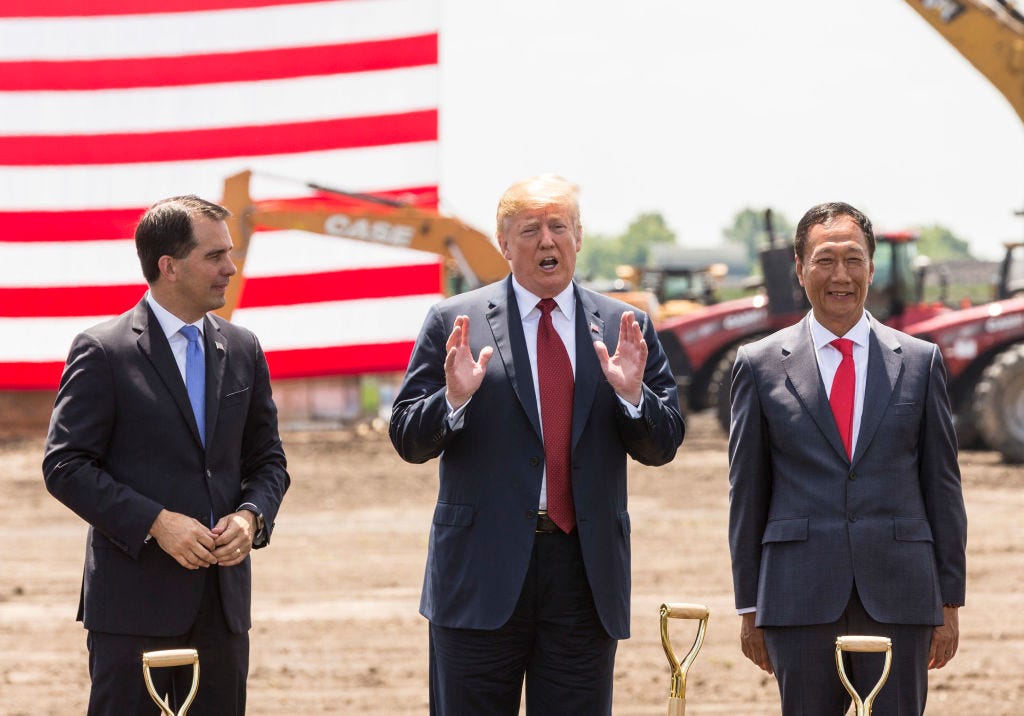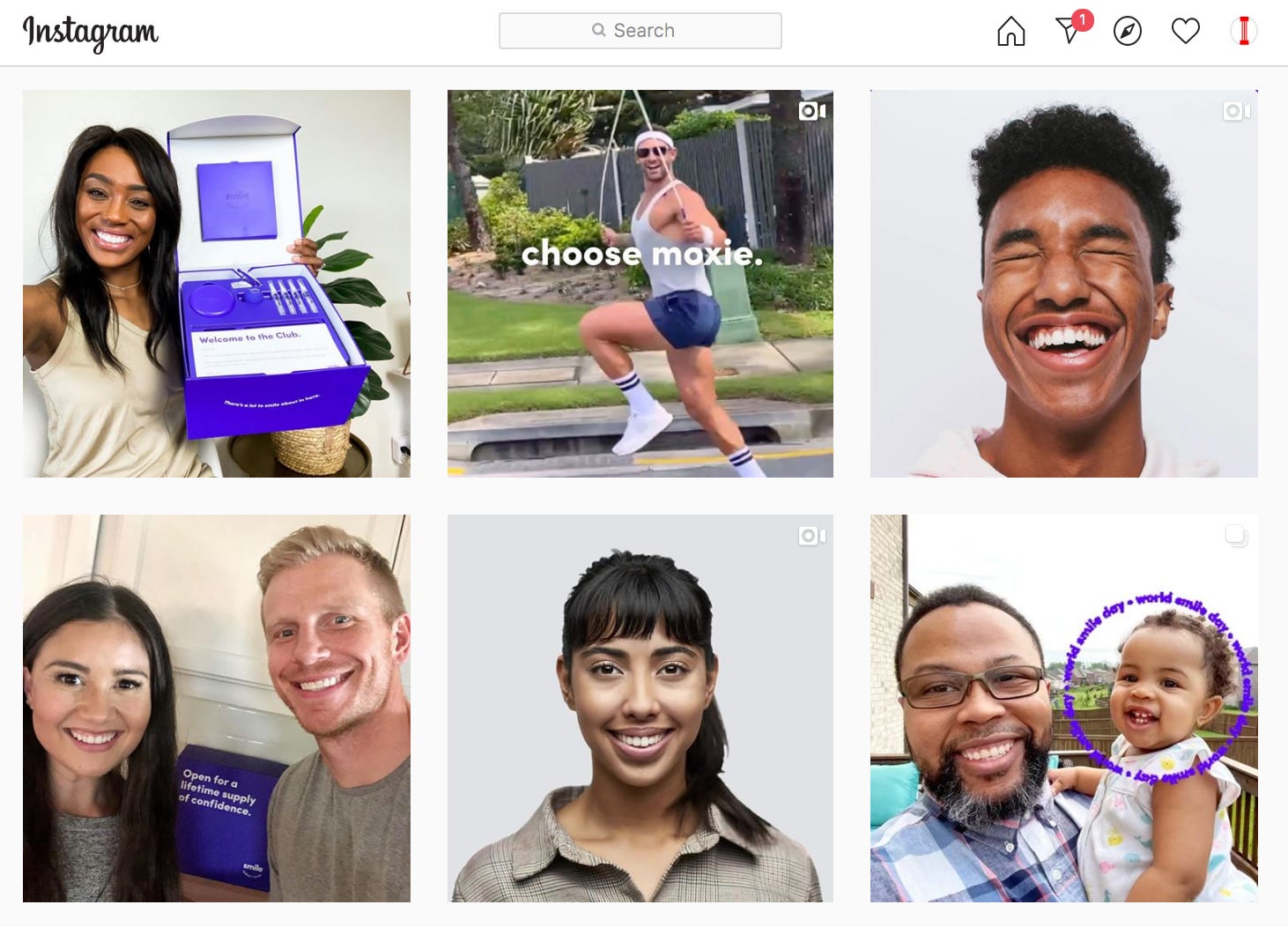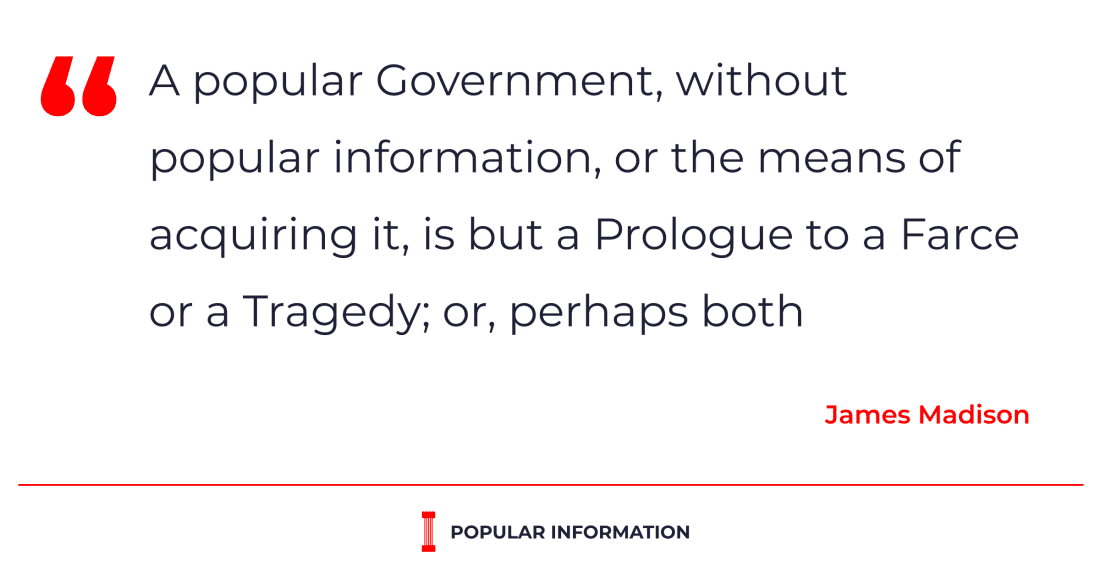 |
U.S. President Donald Trump (C) speaks as Wisconsin Gov. Scott Walker (L) and Foxconn CEO Terry Gou look on at the groundbreaking for the Foxconn Technology Group computer screen plant on June 28, 2018 in Mt Pleasant, Wisconsin (Photo by Andy Manis/Getty Images)
On June 28, 2018, Trump traveled to Mount Pleasant, Wisconsin, and announced that Foxconn, the Taiwanese electronics company, would be building a 20-million-square foot manufacturing facility. Trump said that he had secured an agreement from his "friend," Foxconn chairman Terry Gou, to invest $10 billion and create 13,000 jobs.
And this is just the beginning. I know Terry. This is just the beginning. This is one of the largest plants in the world. And when you think in terms of 20 million feet — if you build in Manhattan a million-foot building, that’s a very big building. They don’t get much bigger. And here you’re talking about more. Think of it: more than 20 million feet. And that’s probably going to be a minimal number.
Trump dubbed the facility the "Eighth Wonder of the World" and claimed it was proof his policies were "restoring America’s industrial might."
Former Wisconsin Governor Scott Walker (R-WI) paid a heavy price to seal the deal. Overall, the state and various localities provided Foxconn $4 billion in incentives. Some of that money has already been paid out. Racine County bought the land for the facility and gave it to Foxconn for free. Property owners had their land seized by the state, paid for by taxpayers, to make way for Foxconn's facility. Millions more were spent on infrastructure improvements. Since all taxes for the project were eliminated, the tax incentives were essentially cash payments to the company. If everything went perfectly, "the state wouldn’t break even until 2043."
The deal quickly began to fall apart. As Popular Information reported in January 2019, a Foxconn spokesman told Reuters that it would not manufacture much of anything in Wisconsin. "In Wisconsin, we’re not building a factory. You can’t use a factory to view our Wisconsin investment," the spokesman said. The facility would "consist of research facilities along with packaging and assembly operations." Foxconn initially estimated it would create 5,200 jobs by 2020. That figure was revised down to 1,000.
Trump was unhappy. He called Gou and convinced him to reverse the announcement. After the conversation, Foxconn released a statement saying it was "moving forward with our planned construction of a Gen 6 [LCD] fab facility." Trump took a victory lap.
But while Foxconn agreed to Trump's demand to keep calling the facility an LCD factory, there was "no further information on the focus of the facility, the size of the investment, or the jobs that will be created." Since then, things have gone downhill.
A new expose by The Verge finds that what "Foxconn calls an LCD factory — about 1/20th the size of the original plan — is little more than an empty shell." Last month, "Foxconn received a permit to change its intended use from manufacturing to storage."
The project has only generated a handful of jobs, "many of them held by people with nothing to do, hired so the company could reach the number required for it to get tax subsidy payments from Wisconsin" at the end of 2019. The company claimed it had hired 580 people, enough to qualify for the tax subsidies. Last week, "Wisconsin rejected the company’s subsidy application and found it had employed only 281 people eligible under the contract" at the conclusion of last year. After the deadline passed, many of those were laid off.
The company built a handful of buildings, including a "multi-purpose" structure and an orb. None of them have any clear purpose. It considered, at various times, using them for "fish farms, exporting ice cream, [or] storing boats." Before striking the massive deal, Foxconn performed "no research into the market for products Foxconn might make or the costs of producing those products in Wisconsin." The company maintains that an LCD factory is coming and recently set up a small line for manufacturing servers. But Foxconn recently acknowledged it "has so far invested 2.8 percent of the $10 billion it promised."
Trump, for his part, continues to stay on message. In an interview with a local Wisconsin station on Sunday, Trump said Foxconn had built “one of the most incredible plants I’ve ever seen.” The company will keep its promises, Trump insisted. But only if he's reelected.
SmileDirectClub CEO sends cash directly to Trump
The CEO of SmileDirectClub – a company that markets itself heavily on social media as diverse and inclusive – has donated hundreds of thousands of dollars to support the reelection of Trump and key Republican Senators.
 |
According to recent FEC filings, Daniel Katzman, CEO of the popular tele-orthodontic company SmileDirectClub, has donated $100,000 to the Trump Victory Fund and $265,300 to the Republican super PAC Hold The Line 2020.
Established in July 2020, Hold The Line is a joint fundraising committee for Senators Susan Collins (R-ME), Steve Daines (R-MT), Joni Ernst (R-IA), Cory Gardner (R-CO), Thom Tillis (R-NC), and Martha McSally (R-AZ) – all of whom are in tight reelection races this fall. So far, the super PAC has raised $895,000.
The donations, however, are at direct odds with SmileDirectClub’s “commitment to diversity and inclusion.” The brand prides itself on providing affordable orthodontic care to low-income, rural, and disabled communities who may not otherwise be able to access these services. Over the years, this pitch, coupled with heavy social media advertising, has allowed SmileDirectClub to build a cult-like following. (Its Instagram boasts more than 435,000 followers.) The company’s mission to “democratize orthodontics” has even lured NBA player Draymond Green as an investor.
“SmileDirectClub was founded with a ground-breaking idea that changed the dental industry and increased consumer access to affordable, safe and efficacious premium oral care,” said Katzman in a statement.
In 2018, the company pulled its advertising from Fox News’ Tucker Carlson Tonight after Carlson said that immigrants make the U.S. “poorer” and “dirtier.” At the time, SmileDirectClub announced that it no longer wanted to run ads “around any political opinions show.”
On June 12, around the peak of Black Lives Matter protests, the company told consumers that it was “listening and learning” and said that it wanted to do its part to “build a world where inclusion, kindness, compassion and decency are experienced by all.”
Four months later, the company's CEO donated $100,000 to Trump.
 |



